What people think about the mob attack on the US Capitol 📊 January 10, 2021
Nearly a supermajority of Americans blame Trump, but 75-85% of Republicans are still fiercely loyal to their leader
Thanks as ever for reading my weekly data-driven newsletter on politics, polling, and democracy. As always, I invite you to drop me a line (or just respond to this email) with any thoughts worth sharing. Please click/tap the ❤️ under the headline if you like what you’re reading; it’s our little trick to sway Substack’s curation algorithm in our favor. If you want more content, I publish subscribers-only posts once or twice a week.
Dear reader,
First: I meant to send this message yesterday but never actually hit the ‘send’ button on Substack’s website. Oops. Hopefully it’ll be on time again next week.
Now for the subject matter…
I was deeply shaken by last week’s events at the US Capitol. While they weren’t that surprising, they were nevertheless shocking. I took a few hours out of my writing time on Thursday to attempt to chart a political-psychological and institutional course of how we ended up where we are — and where we might go from here. You can read that (rather long) piece here.
Today, I want to briefly review the public opinion polls that have come out since Wednesday. They reveal a nation that, overall, is deeply disturbed by the President’s incitement of tens of thousands of Americans to violently storm the US Capitol. But the data are also sobering in revealing the deep levels of commitment to Donald Trump’s authoritarianism among a third of Americans. These polls might prompt us to really consider if, to use president-elect Joe Biden’s words, this is truly “not what America is.” Or, to use The Atlantic journalist Anne Applebaum’s words: American calls for democracy can be thrown back with scorn: You don’t believe in it anymore, so why should we?
I am hopeful for a brighter future. This week’s events, and the data from the aftermaths mind us that hope is not enough.
—Elliott
What people think about the mob attack on the US Capitol
Nearly a supermajority of Americans blame Trump, but 75-85% of Republicans are still fiercely loyal to their leader
It is constantly sobering (almost tragically so) to observe how tolerant Americans are of authoritarianism. Indeed, looking at the "Other links and recommendations" section below you'll see that the official positions of America's second-largest political party are some of the most illiberal in the world; The Republican Party positions toward liberal democracy are close to the right-wing Polish PiS and Turkish AKP, with only a few worldly parties being more extreme.
This week also reminded me of the rise of fascism in America during the 1920s, 30s and 40s. Back then, as with Charles Coughlin the like, a sizable fringe of voters endorsed Nazi attitudes toward minorities and government. But we also had major parties to stop them from gaining power.
Last week's events (both on the House and Senate floor and outside) suggest that the Republican Party has abdicated this traditional role to safeguard democracy. In many ways, it has encouraged components of fascism that have been festering among both its ranks and leadership for years. All of (a) nationalism and ethnic scapegoating, (b) partisan attack to prevent the political opposition from taking power, and (c) attempts to take control of media narration are key political components of fascism, and we saw all three go substantively unpunished last week. Republican voters' dictatorial-like embrace of Trump is also concerning and harkens back to 20th-century models of fascism.
These are hard truths. Again, it is sobering to come face-to-face with both the degree of illiberalism among Americans and the consequences of that illiberalism.
But in consulting the views of everyday Americans, there is some reason for hope. Although 35% of Trump supporters approved of the attack on the Capitol last week, 56% disapproved of the insurrectionists. Further, half of Republicans say the mob does not represent people like them and 69% say they went "too far" in storming Congress. This all according to a new poll from YouGov and the Huffington Post. Overall, 74% of Americans "disapproved of the actions of Trump supporters who stormed into the US Capitol."
These numbers are similar to an instant poll from YouGov taken the night of Wednesday's assault. According to that poll, 62% of Americans view the attack by Trump supporters as a threat to democracy. According to the HuffPost numbers, by a 6-point margin (47% to 41%), Americans think Trump should be impeached for leading the mob.
However, this all amounts only to "cracks, but no rupture" in support for the president, to use Ronald Brownstein's words. According to a new poll from Marist and NPR/PBS, 77% still approve of his job as president. A new poll from Morning Consult arrived at similar numbers. According to their tracking, GOP "strong" support for Trump is at an all-time low — but at 50%, it's still high enough to worry whether any of the underlying causes of Wednesday's events will be abated.
The PBS/NPR/Marist poll also found that nearly a supermajority (63%) of Americans think the president is to blame. That includes nearly every Democrat and a third of Republicans. But the poll also found that 83% of Republicans opposed removing him from office, which will probably prevent Senate Republicans from doing so.
Because we look at polls in aggregate here, consider that an ABC News/Ipsos poll found that 56% of respondents support his removal prior to Inauguration Day — much higher than the other polls. That includes 58% of Independents.
If Trump isn’t removed from office or disqualified from running again? What happens? Morning Consult asked voters if Trump should continue to play a “major,” “minor” or “no” role in the future of the Republican Party. Fewer than a quarter of Republican voters said they should move on from Trump entirely, versus 59% who said he should continue to play a major or minor role.
…
It is worth grappling with last week's events for what they were: the violent and logical result, perpetrated by a small minority of Americans, of the president and his party's conspiracy theories about the election. The mob insurrection showed how significantly weakened the guardrails of American have been over the past decade, and is also materialization of underlying authoritarianism in the GOP.
But it is also worth noting that America has not lost her collective judgment yet, a fact that should reassure anyone who is trying to find a solution to this madness. That illiberalism has run so deep in the GOP should not be cause for giving up on the experiment altogether. Still, action must be taken — if you’re wondering what we might consider, read my post from last Thursday.
Posts for subscribers
January 7: We are witnessing the consequences of Republican radicalization. Yesterday’s mob insurrection against the US government was a direct consequence of Trumpism, nationalism, conspiracy theories, and zero-sum politics
January 4: How much can we trust these polls out of Georgia? There is more uncertainty than even aggregators are letting on
What I'm Reading and Working On
This week, I found myself repeatedly visiting a new book about the history of polling misfires by American University writer/historian/professor W Joseph Campbell. Lost in a Gallup is an informative historical investigation of when polls have gone wrong and why. Though it lacks some technical expertise, it is well written and is good enough at doing what it says on the tin.
Other links and recommendations:
Please read this piece by renowned public political scientist Julia Azari: “The year everything changed, and nothing did.”
Jonathan Chaidt writes for New York Magazine that “Every Trump Loyalist Is Complicit in the President’s Incitement of Sedition”
New polling shows that 65% of Americans approve of $2,000 stimulus checks.
Here’s a good data-driven post from several FiveThirtyEight staff members on how Democrats won the Georgia election. Here’s the kicker on partisan turnout differentials:
Here’s something “funny” about polling: A 1988 academic paper mused about the impossible problem of low response rates, which were around 50-75% depending on the pollster. (Response rates are between 0.5 and 7% today, depending on who you ask.)
And another polling tidbit: Gallup Polls actually adjusted for partisanship of the sample as far back as 1950, when they first started sampling voters by precinct (and thus used sample deviation from actual past presidential election results as an adjustment for election estimates) https://www.jstor.org/stable/2746730
Here’s a very good post from Harvard political scientist Pippa Norris showing just how illiberal today’s Republican Party is. The divide between Democrats and Republicans on commitment to democratic values is roughly as large as their divide over minority rights.
Thanks for reading!
Thanks for reading. I’ll be back in your inbox next Sunday. In the meantime, follow me online or reach out via email if you’d like to engage. I’d love to hear from you. If you want more content, I publish subscribers-only posts once or twice each week.




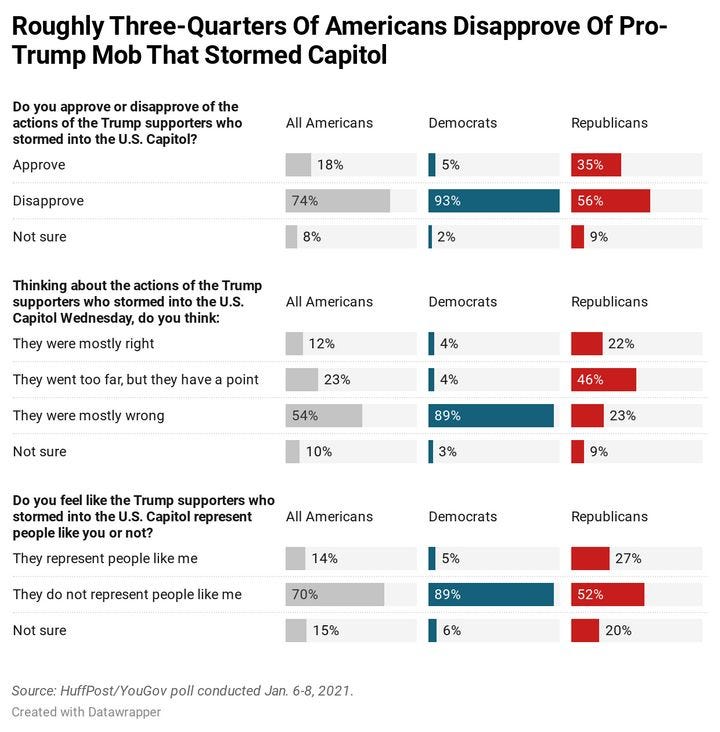
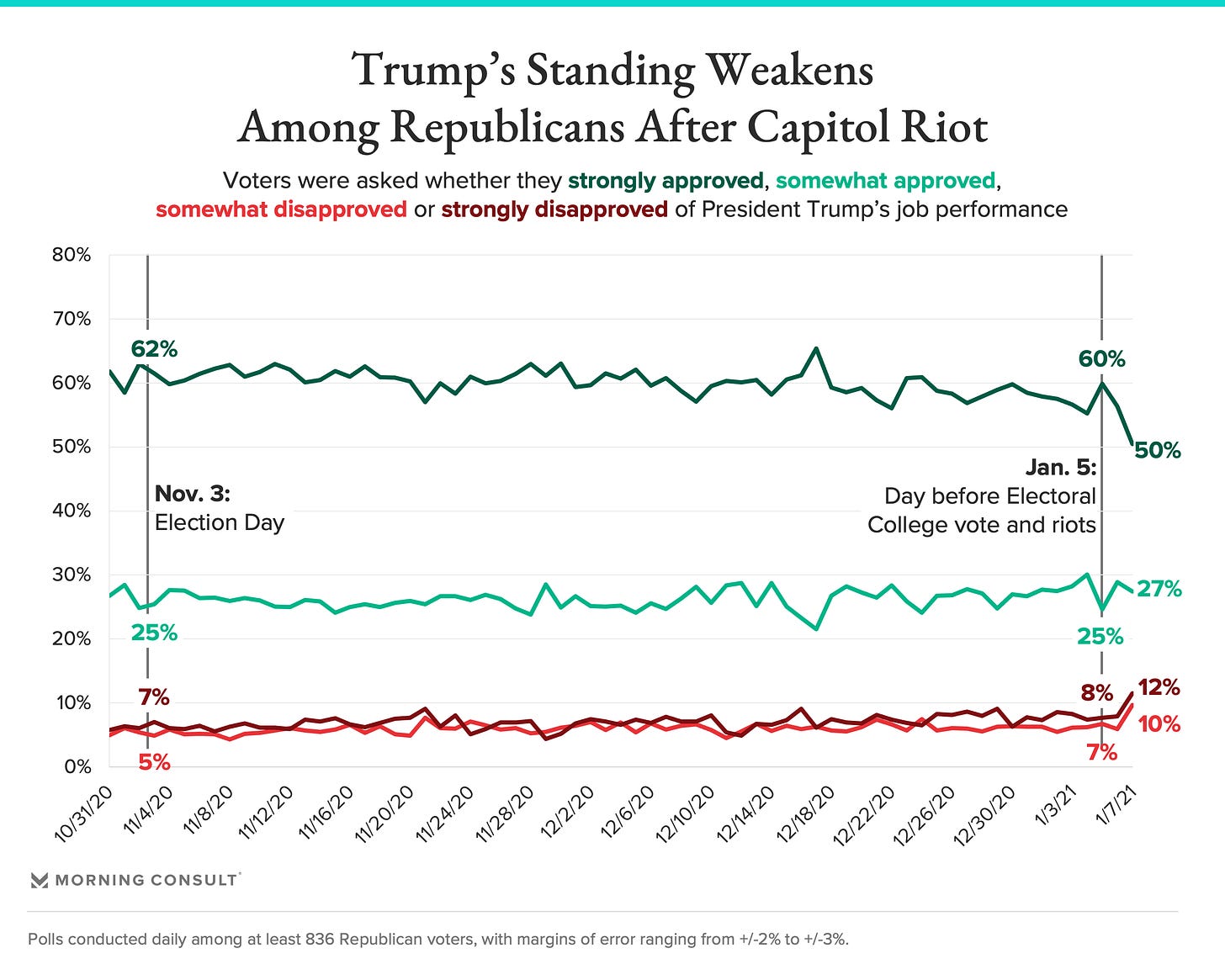
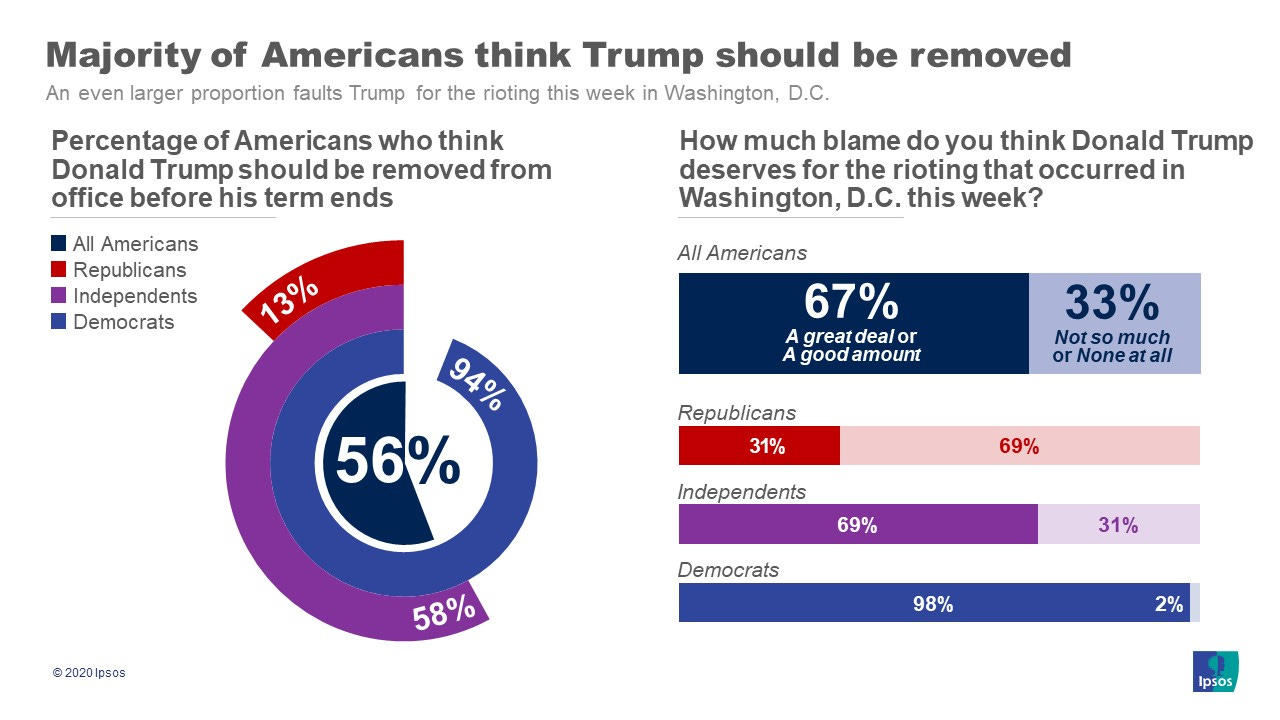
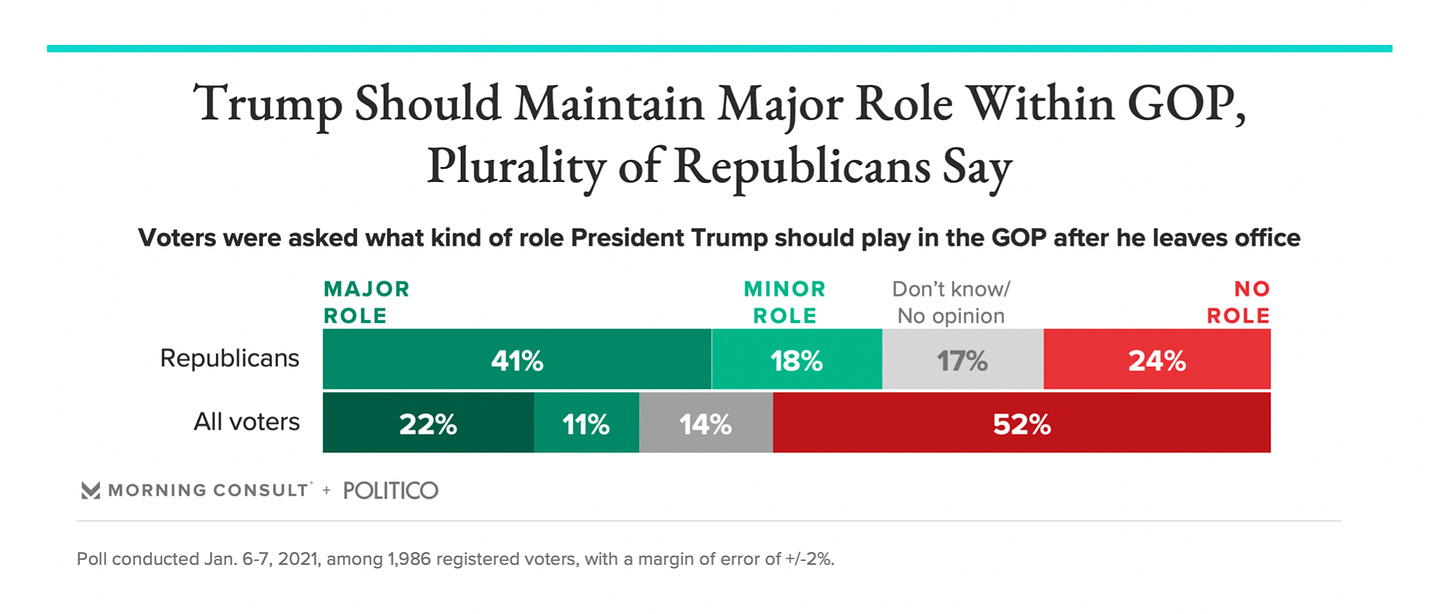
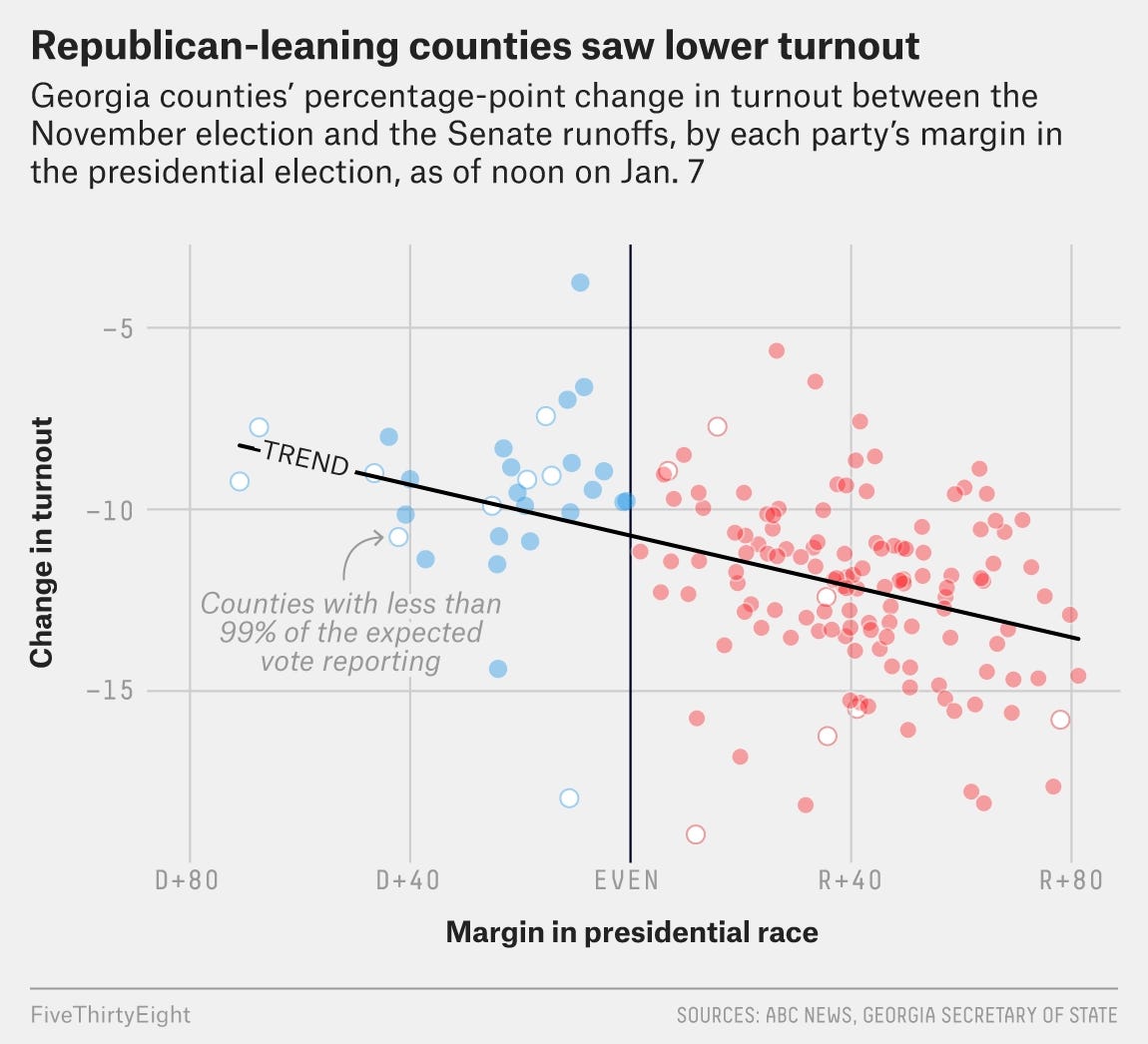


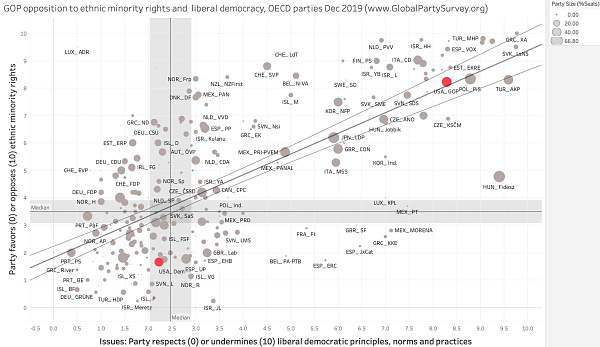
Hi Elliott,
I've been trying to think more clearly after last week. Lawmakers are not interested in upholding the Constitution and democratic norms. A lot of Republicans are shrugging and are basically saying "Biden will be President in 9 days, why should we do anything to Trump?" or outrageously claiming that impeachment would further divide the country. Kevin McCarthy supported challenging Electoral College count, after the attack on the Capital, Kevin McCarthy said: "we must work together to lower the temperature & unite the country to solve America’s challenges." This is insane. I can't imagine that there will be any chance of unity or bipartisanship going forward.
The Trump era proved that Congress doesn’t matter and the President won’t be held accountable in any circumstance. A future President will ignore Congress and the courts and claim vast executive power. I feel like this is the "endgame" of American democracy given polarization, Electoral College and the current election system.
This is quite frightening as well: what kind of a democracy needs 15,000 National Guard members to have a "peaceful" transition of power?
https://twitter.com/GOPLeader/status/1347608166427717633
https://t.co/a5VSsAahEe?amp=1
We need a new President. 9 days is too long.
-Elliot